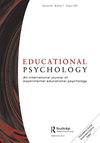Does an instructor’s positive emotion facilitate learning from video lectures across different levels of content difficulty?
IF 3
2区 心理学
Q1 EDUCATION & EDUCATIONAL RESEARCH
引用次数: 0
Abstract
The study investigated the effect of an instructor’s positive (vs. neutral) emotions in video lectures on student learning using either easy or difficult geography topics (i.e. easy: the Earth within the universe; difficult: understanding time and date calculations of Earth). The results showed that, first, students responded more positively towards the video lectures in which the instructor demonstrated a positive emotional state, compared to videos with a neutral instructor, regardless of content difficulty. Second, the content difficulty of the video lecture moderated the effect of the instructor’s positive emotion on students’ retention performance. Notably, for the easy content, the instructor’s positive emotion significantly enhanced retention performance. Third, the instructor’s positive emotion in the both easy and difficult video lectures improved students’ transfer performance. This beneficial effect was found to be mediated by students’ perceived attention during the learning process. These findings contribute to our understanding of the effects of emotional design in video lectures. Practical recommendations drawn from these findings should be interpreted with consideration of the study context and complemented with other empirical evidence, however one interpretation of these results can be that instructors should consider displaying positive emotions while teaching, particularly when delivering easier content, to improve both retention and transfer performance among students.教师的积极情绪是否有助于跨越不同内容难度的视频讲座的学习?
该研究调查了教师在视频讲座中积极(与中立)的情绪对学生学习的影响,这些视频讲座涉及简单或困难的地理主题(即简单的:宇宙中的地球;困难:理解地球的时间和日期计算)。结果表明,首先,无论内容难度如何,学生对讲师表现出积极情绪状态的视频讲座的反应比中性讲师的视频讲座更积极。第二,视频讲座的内容难度调节了教师积极情绪对学生记忆效果的影响。对于简单的内容,教师的积极情绪显著提高了记忆效果。第三,在易、难视频讲座中,教师的积极情绪都提高了学生的迁移表现。研究发现,学生在学习过程中感知到的注意力是这种有益效果的中介。这些发现有助于我们理解视频讲座中情感设计的影响。从这些发现中得出的实用建议应该考虑到研究背景并辅以其他经验证据来解释,然而,对这些结果的一种解释是,教师应该考虑在教学中表现出积极的情绪,特别是在传授更容易的内容时,以提高学生的记忆和转移表现。
本文章由计算机程序翻译,如有差异,请以英文原文为准。
求助全文
约1分钟内获得全文
求助全文
来源期刊

Educational Psychology
Multiple-
CiteScore
6.40
自引率
6.20%
发文量
57
期刊介绍:
This journal provides an international forum for the discussion and rapid dissemination of research findings in psychology relevant to education. The journal places particular emphasis on the publishing of papers reporting applied research based on experimental and behavioural studies. Reviews of relevant areas of literature also appear from time to time. The aim of the journal is to be a primary source for articles dealing with the psychological aspects of education ranging from pre-school to tertiary provision and the education of children with special needs. The prompt publication of high-quality articles is the journal"s first priority. All contributions are submitted "blind" to at least two independent referees before acceptance for publication.
 求助内容:
求助内容: 应助结果提醒方式:
应助结果提醒方式:


